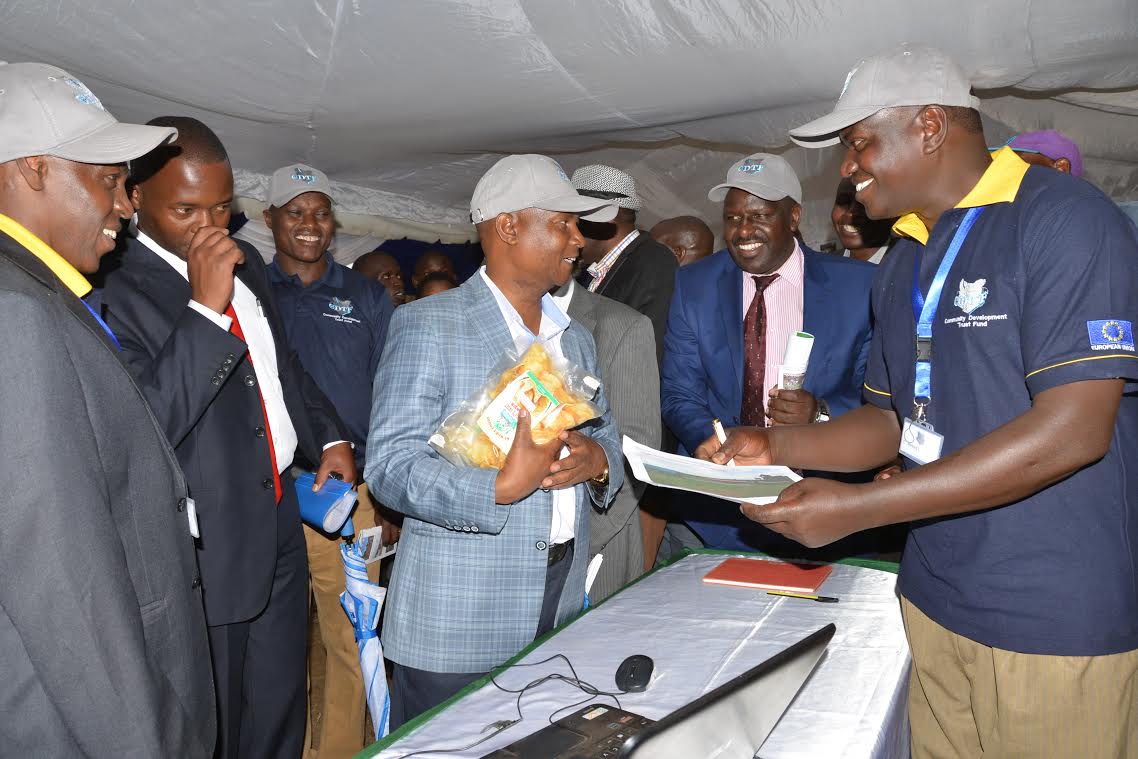
European Union and Danish International Development Agency funded the two projects at a cost of over Kshs51.5 million through the Community Development Trust Fund (CDTF). Nakuru Governor Kinuthia Mbugua has pledged to work closely with the two organisations. Photo/COURTESY.
The two organizations noted that supporting community projects aimed at poverty reduction through livelihood systems and the conservation of community natural resources is key in ensuring enhanced environmental management and governance.
Speaking during the commissioning of the Kamulu Mucheene Environmental Conservation and Lanameduba Ecosystem Conservation projects in Meru and Nakuru Counties respectively, Head of Operations, European Union, Kenya, Erik Habers, said the initiative was aimed at attaining a well-managed and conserved forest for sustained yields, reduced pressure on the forest through adoption of energy saving devices and improved household income from increased farm productivity and empowered community.
“If productivity of the locals land can be improved through appropriate irrigation technologies, majority of the community members who over-rely on forests for their dairy activities would desist from forest destruction as they shall have alternative means of livelihoods,” he said.
European Union and Danish International Development Agency funded the two projects at a cost of over Kshs51.5 million through the Community Development Trust Fund (CDTF).
The Kamulu Mucheene Environmental Conservation Project aims at rehabilitating degraded Mucheene forest areas under Plantation Establishment and Livelihood Improvement Programme (PELIS) by planting indigenous and exotic tree seedlings, reduce pressure from the forest through the adoption of energy saving cooking stoves and fireless baskets and improving community livelihoods through adoption of drip irrigation and capacity building of community members.
Since the project commenced in 2012, over 300,000 tree seedlings have been planted in 158hactares of the Mucheene forest and also income generating activities set up for the locals including six greenhouses, 15 drip kit units installed successfully, 50 Langstroth bee hives procured and installed and a honey processing machine provided, 49 Chuff cutters procured and distributed to beneficiaries.
Through the adoption of energy saving stoves, the frequency of obtaining firewood collection permit from the Kenya Forest Service offices, has greatly reduced as a result of decrease in firewood demand per household. The energy saving stoves technology has greatly reduced pressure from the forest, thus the forest cover is under reduced threats from exploitation.
‘’As the community surrounding Mucheene Forest, it was until the project commenced that we realized the benefit of creating good relations with the Managers of Natural resources’ especially the management of Mucheene Forest Station. The said, good relations powered by the funds from European Union (EU) through Community Development Trust Fund (CDTF) have instilled a sense of ownership of the Forest to the community. This stimulated by Plantation Establishment for Livelihood Improvement Scheme (PELIS) programme has gone way ahead in reducing illegal logging in the forest. By the time the project duration lapses, we are anticipating wholly, to have fully attained the solutions to, over – exploitation of forest resources and ignorance & lack of knowledge in natural resource management and livelihood issues,’’ said Albert Mwenda, Community member.
On the other hand, the Sh31.5 million Lanameduba Ecosystem Conservation project aims to promote sound environmental awareness, community participation and involvement in soil and water conservation and management and enhanced food security.
Lanameduba Ecosystem Conservation project The project seeks to protect and conserve the forest and water catchment areas of Menengai, Dundori and Bahati forests, improve community livelihood through nature based initiatives, income generating activities and drought coping strategies and further control soil erosion and enhance river banks protection through appropriate land use practices.
“The problem faced by the Lanameduba community are depletion of forest resources by local communities due to poverty and insufficient intervention by the government. The initiative has addressed these challenges through capacity building efforts involving both men and women and engagement government,” he said.
This project is funded by the European Union (EU) through Community Development Trust Fund (CDTF) with a budget of Ksh31.5 million of which CDTF contributed Kshs.28.3million while the community contributed Sh.3.1 million.










































